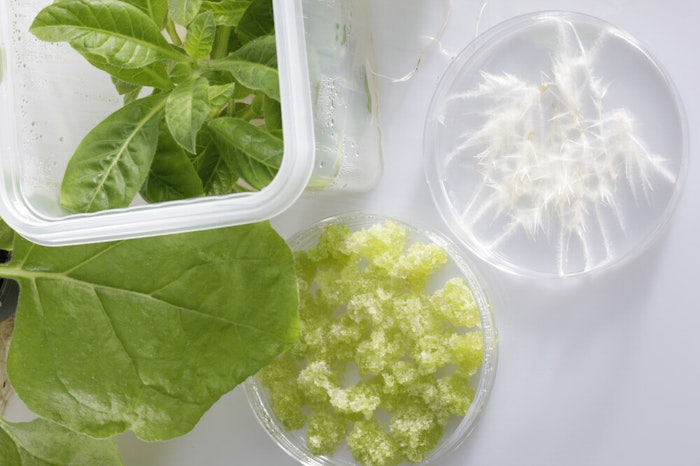
Described as a landmark achievement for cosmetic science, some ~25 plant-based extracts were identified for their strong potential for next-generation anti-aging and anti-inflammatory skin care using a unique collaborative screening approach.
Coordinated by VTT Technical Research Centre of Finland, in conjunction with 16 partners from 11 European countries, the EU-funded InnCoCells project's objective was to establish new, sustainable production systems for plant-derived cosmetic ingredients with scientifically validated biological activity and efficacy.
 InnCoCells combined advanced plant science, biotechnology and cultivation methods with circular approaches such as the upcycling of agricultural side-streams.Image courtesy of VTT
InnCoCells combined advanced plant science, biotechnology and cultivation methods with circular approaches such as the upcycling of agricultural side-streams.Image courtesy of VTT
Screening Collaboratively for Biological Efficacy
According to VTT, the project signals a shift in how cosmetic ingredients are discovered, validated and developed. Traditional screening has centered on single isolated plant compounds, whereas InnCoCells has taken a broader approach.
A fundamental principle of the InnCoCells approach, per VTT, is to extensively validate the biological activity of all the ingredients developed thanks to the participation of partners with a wide range of cell-based assays. Plant extracts and natural products with the most promising activities and environmentally friendly production processes are then advanced to testing in human volunteers.
 More than 100 plant extracts have been screened for effects on 20 skin-related biomarkers related to inflammation and aging.Image courtesy of VTT
More than 100 plant extracts have been screened for effects on 20 skin-related biomarkers related to inflammation and aging.Image courtesy of VTT
To date, more than 100 plant extracts have been screened for effects on 20 skin-related biomarkers related to inflammation and aging. This revealed ~25 extracts suitable for development as skin care product ingredients. Importantly, these extracts can be sustainably produced using methods like plant cell and tissue cultures in bioreactors, greenhouse cultivation or by repurposing agricultural by-products.
3 Breakthrough Plant Extract Discoveries: Danish Scurvygrass, Pepper and Basil
Among the standout discoveries VTT reports are three extracts: Cochlearia danica (Danish scurvygrass), Capsicum chinense (a tropical pepper) and hairy roots of Ocimum basilicum (basil).
- Cochlearia danica cell cultures: demonstrated exceptional anti-inflammatory, anti-aging and antimicrobial properties, outperforming many single-compound ingredients on the market.
- Capsicum chinense extracts: showed strong anti-aging effects, protecting skin cells from stress without causing irritation, and exhibited antimicrobial activity against harmful bacteria including MRSA.
- Basil hairy root extracts: revealed unique anti-collagenase and anti-hyaluronidase activities, offering potential to combat skin aging while preserving hydration.
“These findings highlight how nature and science can come together to create the next generation of cosmetic ingredients,” said Kirsi-Marja Oksman-Caldentey, InnCoCells coordinator at VTT.
“For the first time, we are building a pipeline of ingredients that combines scientifically proven skin benefits with responsible, scalable production. This reflects consumer demand and aligns with the goals of the European bioeconomy.”
About the InnCoCells Collaboration
The InnCoCells project is funded by the EU's Horizon 2020 program, with a total budget of €7.9 million, and has spanned 4.5 years, bringing together 17 partners, including universities, research institutes, SMEs, one large company and sectoral organizations.
To achieve this, the consortium employed advanced plant science, biotechnology and cultivation methods such as greenhouse, aeroponic and plant cell culture technologies. Circular approaches, including the upcycling of agricultural side streams, were also integrated to ensure environmental sustainability.
According to VTT, the project’s comprehensive approach ensures that discoveries can efficiently transition from laboratory testing to real-world cosmetic applications.
From Lab to Market: Next Steps
VTT and its partners are actively exploring business models to bring these ingredients to market. The aim is to collaborate with industry partners to integrate these extracts into skin care formulations, meeting the growing demand for sustainable and effective beauty solutions.
The InnCoCells project not only represents the most comprehensive exploration of plant-based cosmetic ingredients to date, but also sets a new benchmark for sustainable innovation in the beauty industry, VTT reports. By combining advanced plant science with circular production methods, the project paves the way for next-generation skin care solutions that are both effective and environmentally responsible.





!['We believe [Byome Derma] will redefine how products are tested, recommended and marketed, moving the industry away from intuition or influence, toward evidence-based personalization.' Pictured: Byome Labs Team](https://img.cosmeticsandtoiletries.com/mindful/allured/workspaces/default/uploads/2025/08/byome-labs-group-photo.AKivj2669s.jpg?auto=format%2Ccompress&crop=focalpoint&fit=crop&fp-x=0.49&fp-y=0.5&fp-z=1&h=191&q=70&w=340)




